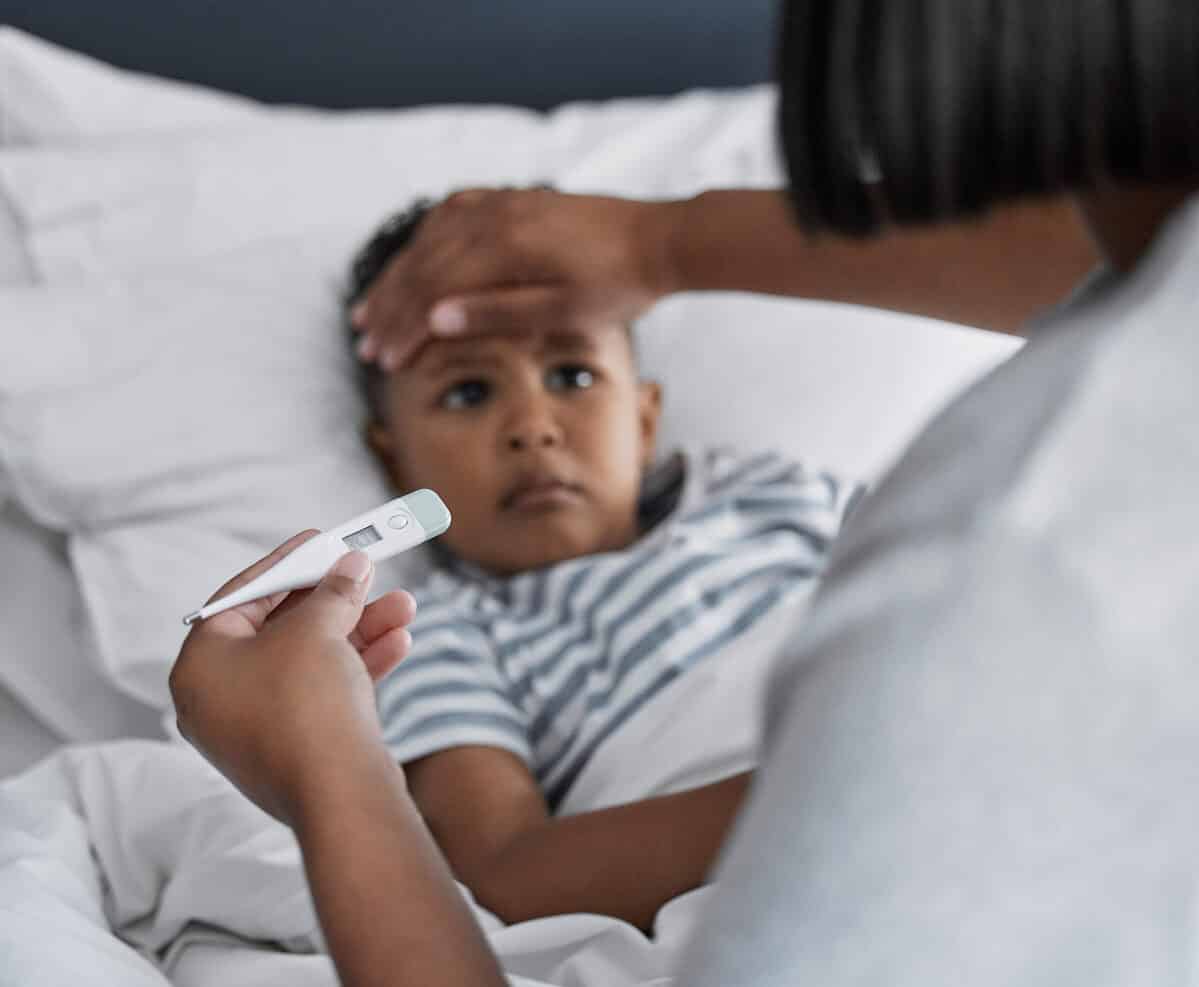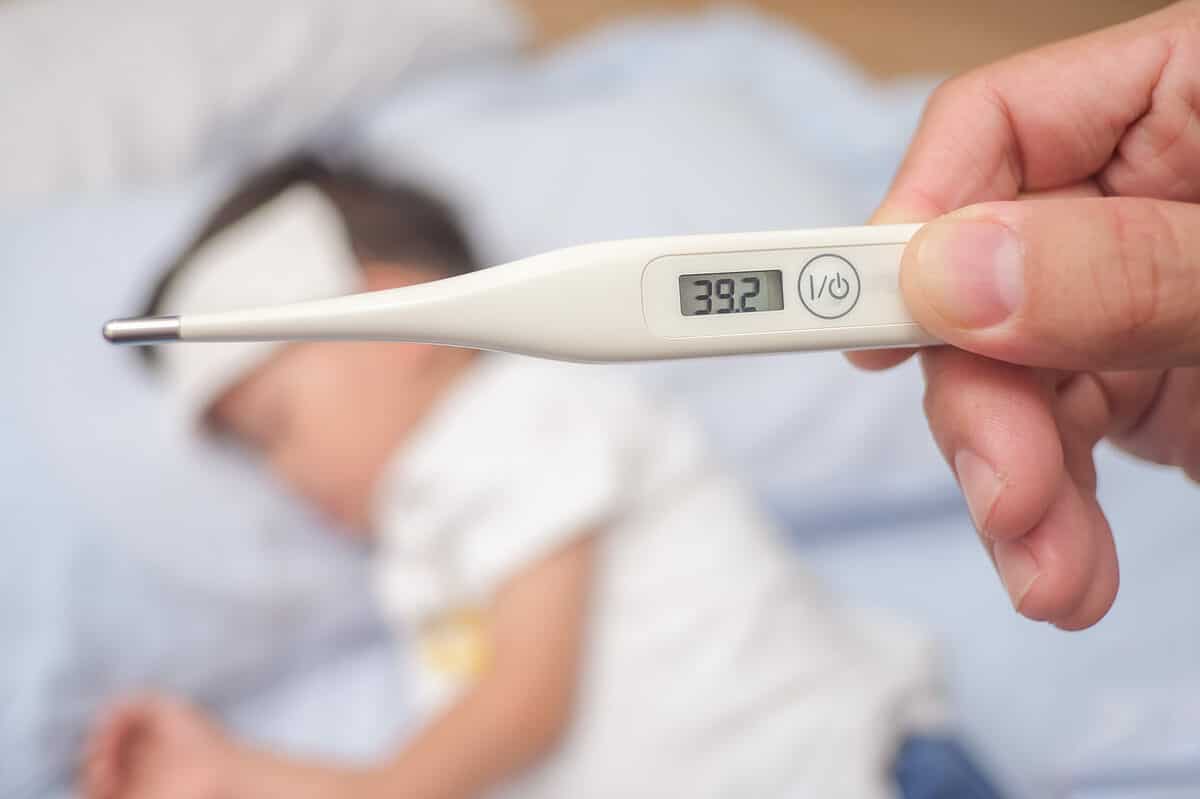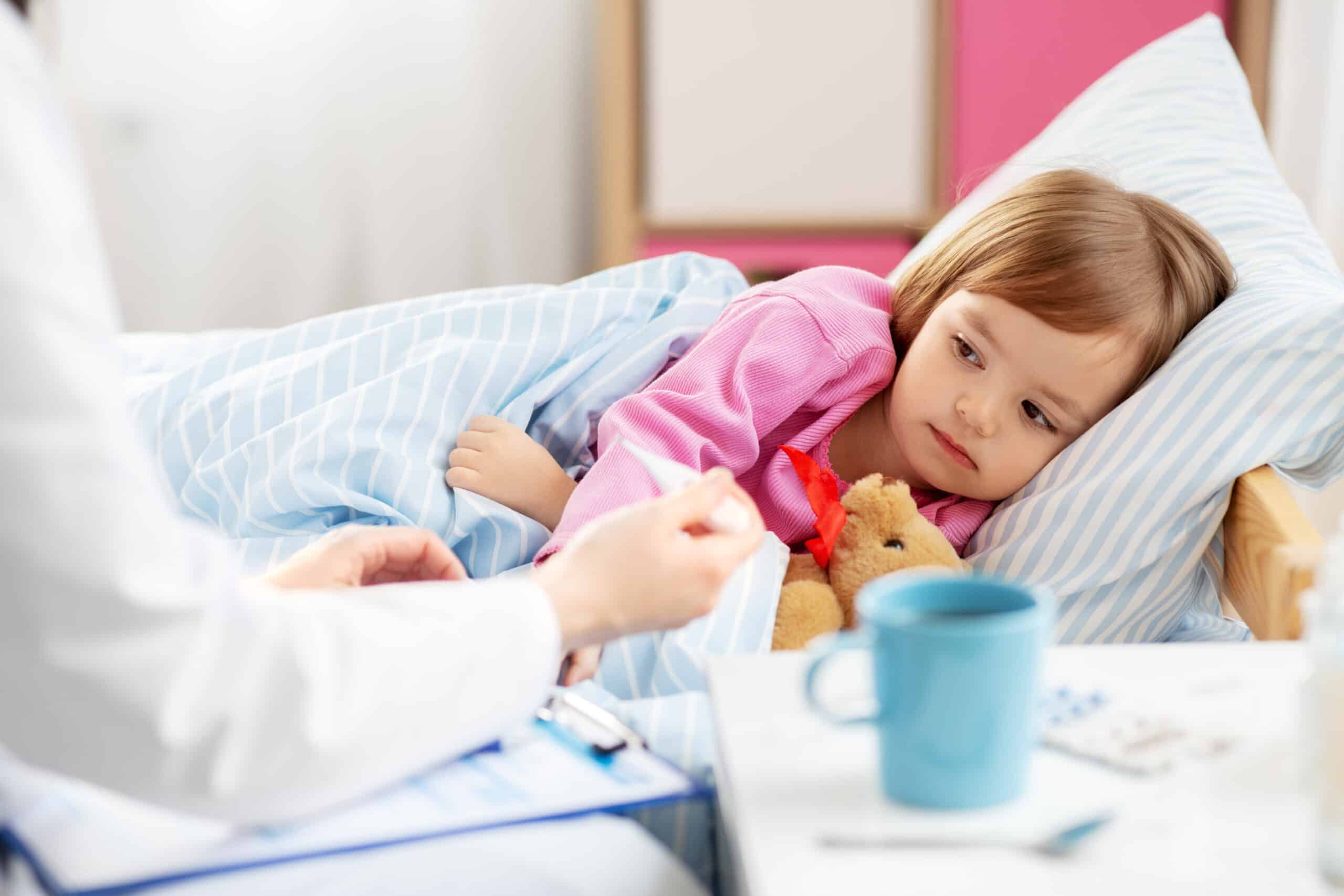As a parent, it can be incredibly terrifying when your children get sick, especially if this is your first child. It is natural for many people to get extremely worried when they see that their toddler has a fever, cough, or other signs of sickness. However, while it is important to take care of your kids, in many cases a fever is not a cause for alarm. With that said, there are some instances where you may want to bring your child in for a checkup. In this article, we will clear up all of the confusion associated with when to take your toddler to the hospital.
Key Points
- If your toddler has a fever of over 105 degrees Fahrenheit, you should take them to the hospital.
- If your child is two months or younger and has a fever of greater than 100.4, take them to the doctor.
- If your child's fever persists for more than five days, take them to a doctor.
When Should You Take Your Toddler to the Hospital?

©iStock.com/PeopleImages
The answer to this question is not so straightforward. There are different variables to consider, and many doctors will tell you that you only need to rush your child to the hospital or emergency room in extreme cases. With that said, according to the Children’s Hospital of Los Angeles, you only need to bring your toddler in for medical care if they have a fever of over 105 degrees Fahrenheit.
That temperature may seem high, but typically, a fever of 100 degrees or higher is not worth a trip to the ER or pediatrician. In fact, it may be hard to believe, but a fever is actually a good thing as long as it doesn’t get out of control.
A fever is your toddler’s natural way of fighting off the bacteria and viruses that are making them sick. By raising their core temperature, the germs cannot survive, and your child can get better. A fever also helps the immune system to produce more white blood cells, which helps to prevent another infection in the future.
Getting a fever can be so beneficial that studies show that people who suppress fevers with medication are sick for three days longer than people who didn’t take any medication at all. Plus, medication may only reduce a fever by two or three degrees, so their temperature will still be high. But again, that is the point.
Signs You Should Not Ignore
While fevers on their own are not always a cause for concern, there are certain instances when seeing a doctor is essential.
Fever at Certain Ages
There are some times when it is better to be safe and bring your child to the doctor:
- Your child has a fever that lasts more than five days.
- A baby 2 months old or younger has a fever over 100.4 degrees.
- A child of any age with a fever over 105 degrees.
- If your child suddenly develops a fever over 102 and they don’t have any other signs of sickness.
- Your baby is fussy and cannot be soothed.
Take Your Toddler to the Hospital if They Show These Symptoms
If your toddler doesn’t fall under any of the scenarios listed in the bullet points above but they have a fever paired with any of the symptoms below, then you should bring them to the doctor.
- Shortness of breath
- A red or purple rash that is spreading
- Extreme weakness
- Altered mental state
- Severe pain
- Dehydration (dry diapers or dark urine)
- Headache or stiff neck
- Your child has a seizure that lasts longer than two minutes.
How to Take Your Toddler’s Temperature and Get a Dependable Reading
Before you start to take drastic measures, you need to take your child’s temperature. How you take their temperature will depend on their age. Most experts recommend the following:
Under 3 Months of Age – Rectal or forehead thermometer
Over 4 months of Age – Forehead, rectal, or axillary thermometer.
4 years or older – Oral, rectal, or axillary thermometer.
Avoid taking your toddler’s temperature right after a bath or if they have just recently been under a pile of blankets, as that can affect the outcome. Stay with your child when you take their temperature to ensure an accurate reading. If you have reason to believe a reading may not be accurate, take it again just to be sure.
How To Help Your Toddler Manage a Fever

©iStock.com/yaoinlove
In order to avoid the need to take your toddler to the hospital, it is important that you try to manage their illness so they can become healthy once again. Try these tips to reduce the fever:
- Dress your child in light clothing. Thick clothes will trap in the heat and could lead to a hotter core temperature.
- Have your toddler drink plenty of fluids, including juice, water, or popsicles.
- Put your child in a lukewarm bath to help cool them down. Do not draw a hot bath, as that will have the opposite effect.
- Offer small amounts of food but don’t force feed them.
- Use very little medication. Tylenol will do the trick for all children over 2 months old.
- A cold washcloth on their forehead will provide some comfort.
- Having your child lay on cool sheets can help reduce a temperature.
- Make sure they have plenty of opportunity to rest. Keep their sleeping area calm, quiet, and dark when you have them laying down to try to encourage them to rest.
- If it's hot outdoors, keep your child indoors. Fresh air is often beneficial to a speedy recovery, but if it's hot outside this could only worsen your child's fever. Consider running the A/C or using a fan on your child, but don't overdo it. Always supervise your toddler if you're running a fan near them that's short enough for them to access. Toddlers don't know any better and may stick their fingers into a box fan if they can.
Other Instances When You Should Take Your Child to the Doctor
Outside of the guidelines provided above, there are other instances where you should take your toddler to the doctor that may not include a fever.
Be aware of behavioral changes:
Severe changes in behavior – Your toddler is very difficult to awaken on a recurring basis. Or, they may be crying more than usual or particularly intensely for a long period of time. This could indicate that they are in pain.
Changes in appetite – Your toddler refuses to eat for several meals, or they eat, but much less than normal. Alternatively, if your child is unable to keep food down or is only able to eat certain foods without vomiting.
Tender naval – Your child cries and points to their umbilical area, or it becomes red or starts to ooze or bleed.
Potentially Dangerous Symptoms
If your toddler experiences any of the following medical issues, then it is wise to contact the doctor or go to the ER:
Diarrhea – If your child has more than three especially loose or watery stools.
Vomiting – Excessive vomiting or vomit that doesn’t dribble down their chin but instead shoots out of their mouth several inches.
Dehydration – Signs of extreme dehydration in toddlers include dry diapers, dry mouth, or they cry but don’t have many tears.
Constipation – Your baby has noticeably fewer bowel movements than usual, or they appear to be uncomfortable or struggling.
Cold – If your toddler has a cold that lasts for more than 10 days, experiences ear pain, or a cough that lasts more than a week, then bring them to the doctor.
Rash – Your toddler has an unexpected rash that spreads.
Eye Discharge – Both of your toddler’s eyes are swollen, red, or leaking mucus.
Bleeding – If your child has any blood in their vomit or stool, or is bleeding from a place where they shouldn't be, take them to the ER.
Respiratory issues – If your child is struggling to breathe and you can't identify a cause, then take them to the ER immediately. It's worth it to learn how to perform the Heimlich maneuver on children, just in case your child ever swallows something they shouldn't and chokes.
Conclusion
In the end, it is definitely scary if your toddler develops a fever or experiences any of the ailments discussed here. However, it is important to know when panic is necessary and when home remedies can cure the issue. When in doubt, it is better to bring your toddler to the hospital so you can have peace of mind and ensure that your child can get the care that they need. Remember that the advice in this article should not be taken as professional medical advice; always consult your doctor if you have any concerns or questions.
The image featured at the top of this post is ©iStock.com/dolgachov.
